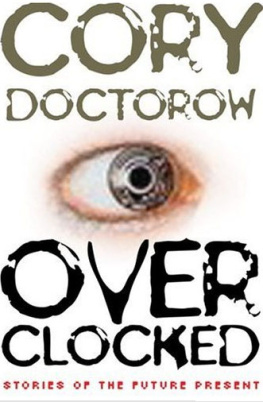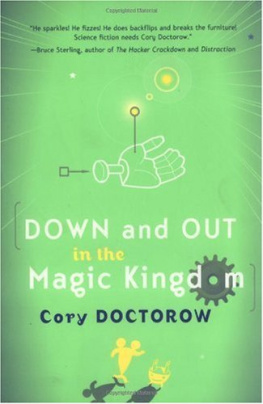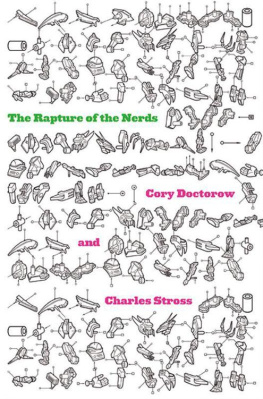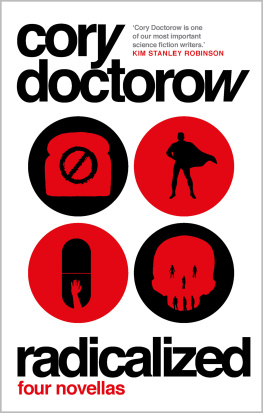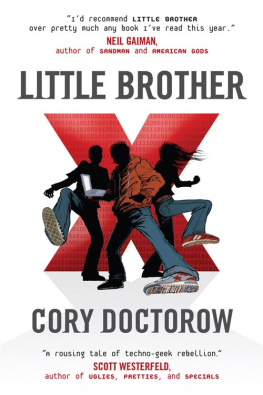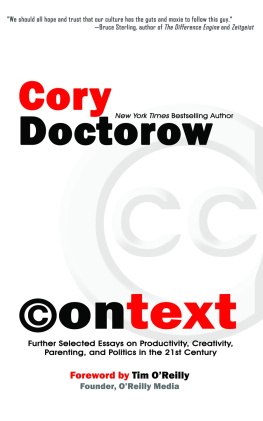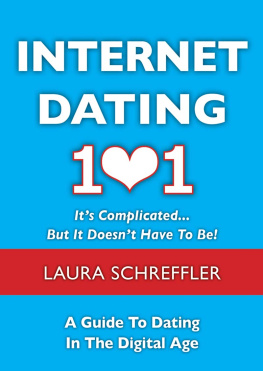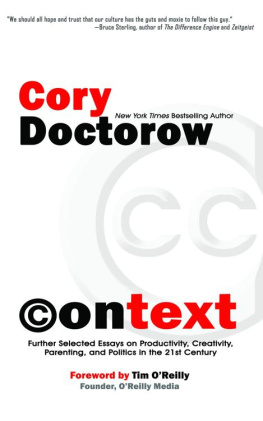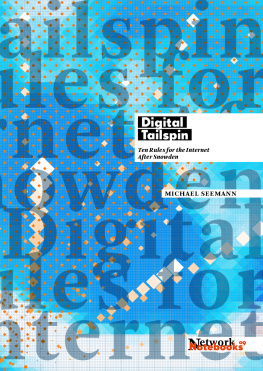INFORMATION
DOESNT WANT
TO BE FREE


McSWEENEYS
SAN FRANCISCO
Copyright 2014 Cory Doctorow
Cover design by Sunra Thompson.
All rights reserved, including right of reproduction in whole or in part, in any form.
McSweeneys and colophon are registered trademarks of McSweeneys, a privately held company with wildly fluctuating resources.
ISBN 978-1-940450-23-0
10 9 8 7 6 5 4 3 2 1
www.mcsweeneys.net
Contents
George shook his head slowly. Youre wrong, John. Not back to where we were. This morning, we had an economy of scarcity. Tonight, we have an economy of abundance. This morning, we had a money economyit was a money economy, even if credit was important. Tonight, its a credit economy, one hundred percent. This morning, you and the lieutenant were selling standardization. Tonight, its diversity. The whole framework of our society is flipped upside down. He frowned uncertainly.
And yet, youre right, too. It doesnt seem to make much difference. Its still the same old rat race. I dont understand it.
from Business as Usual, During Alterations, by Ralph Williams (Astounding Science Fiction, 1958)
I BOUGHT A box of SF pulps when I was in my late teens from one of my fathers friends, who kept them in the garage. English editions of Astounding Science Fiction, for the most part. Stories written by authors whose names I barely recognized, despite being a science-fiction reader from about as soon as I could read.
I paid more than I could afford for them.
I suspect that one story paid for all of them, though.
Its a thought experiment. Until recently Id forgotten the opening of the story (aliens decide to Mess With Us) but remembered what happened after that.
Were in a department store. And someone drops off two matter duplicators. They have pans. You put something in pan one, press a button, and its exact duplicate appears in pan two.
We spend a day in the department store as they sell everything they have as cheaply as possible, duplicating things with the matter duplicator, making what they can on each sale, and using checks and credit cards, not cash (you can now perfectly duplicate cashwhich obviously is no longer legal tender). Toward the end they stop and take stock of the new world waiting for them, and realize that all the rules have changed, but craftsmen and engineers are more necessary than ever.
They realize that companies wont be manufacturing millions of identical things, but will need to make hundreds, perhaps thousands, of slightly different things. That their stores will be showrooms for things, and stockrooms will be history. That there will now be fundamental changes in 1950s-style retailingincluding, to use a phrase that turned up well after 1958, a long tail.
Being Astounding Science Fiction, the story contains the moral of 95 percent of Astounding Science Fiction stories, which could perhaps be reduced to: people are smart. Well cope.
When my friends who were musicians first started complaining sadly about people stealing their music on Napster, back in the 1990s, I told them about the story of the duplicator machines. (I could not remember the name of the story or the author. It was not until I agreed to write this foreword that I asked a friend, via email, and found myself, a Google later, re-reading it for the first time in decades.)
It seemed to me that copying music was not stealing. It was something else. It was the duplicator machine story: you were pressing a button and an object appeared in the pan. Which meant, I suspected, that music-as-object (CD, vinyl, cassette tape) was going to lose value, and that other thingsmostly things that could not be reproduced, things like live shows and personal contactwould increase in value.
I remembered what Charles Dickens did, a hundred and fifty years before, when copyright laws meant that his copyrights were worth nothing in the U.S.: he was widely read, but he was not making any money from it. So he took the piracy as advertising, and toured the U.S. in theaters, reading from his books. He made money, and he saw America.
So I started doing Evenings with Neil Gaiman as fund-raisers for the Comic Book Legal Defense Fund, and learning how to do thathow to make an evening interesting for an audience, with just me and a stage and things Id written, partly because it seemed to me that one day it might not be as easy to make money from selling stories in the traditional way, but that business might still continue more or less as usual, during the alterations, if there were other things I could do.
And so as the nature of music-selling changed utterly and fundamentally, I just stood and watched and nodded. Now the nature of book publishing is changing, and the only people who claim to know what the landscape of publishing will look like a decade from now are either fools or deluding themselves. Some people think the sky is falling, and I do not entirely blame them.
I never worried that the world was ending, because as a teen Id read a thought experiment in an SF pulp published two years before I was born. It stretched my head.
I know that the view is going to be very different in the future, that authors are going to get their money from different places. I am certain that not all authors can be Charles Dickens, and that many of us became authors in order to avoid getting up on stages in the first place, and that its not a solution for everybody or even for most of us.
Fortunately, Cory Doctorow has written this book. Its filled with wisdom and with thought experiments and with things that will mess with your mind. Once, while we were arguing, Cory came up with an analogy that explained the world we were heading into in terms of mammals and dandelions, and Ive never seen anything quite the same way since.
Mammals, he said, and I paraphrase here and do not put it as well as Cory did, invest a great deal of time and energy in their young, in the pregnancy, in raising them. Dandelions just let their seeds go to the wind, and do not mourn the seeds that do not make it. Until now, creating intellectual content for payment has been a mammalian idea. Now its time for creators to accept that we are becoming dandelions.
The world is not ending. Not if, as Astounding Science Fiction used to suggest, humans are bright enough to think our way out of the problems we think ourselves into.
I suspect that the next generation to come along will puzzle over our agonies, much as I puzzled over the death of the Victorian music halls as a child, and much as I felt sorry for the performers who had needed only thirteen minutes of material in their whole life, and who did their thirteen minutes in town after town until the day that television came along and killed it all.
In the meanwhile, its business as usual, during alterations.
IM A STREET performer. Nowadays I do other things too. Im a rock star as well, and I run the business that is my life and my job. But before I was a rock star, between about 1998 and 2002, street performing was how I paid my rent, bought my beer, and fed myself. My act was called The Eight-Foot Bride. I was a Living Statueyouve probably seen something like it. I stood on a box, white from head to toe, dressed as a mournful bride in a Victorian wedding gown and bridal veil (purchased for $19.95 at a Boston thrift shop), accessorized with long white gloves ($9.95, purchased at the fabric store in Waltham, replaced every forty performances or so) and a black wig ($29.95, purchased at Dorothys Boutique, in Boston, replaced about twice a year). I came to life and sorrowfully handed a white daisy-pom flower (purchased at discount for $2 per bunch from a sympathetic florist on the corner who gave me his day-old rejects) to each and every person who dropped any amount of money into an old-fashioned tin milk jug (stolen from my folks house) that lay at my feet.
Next page

